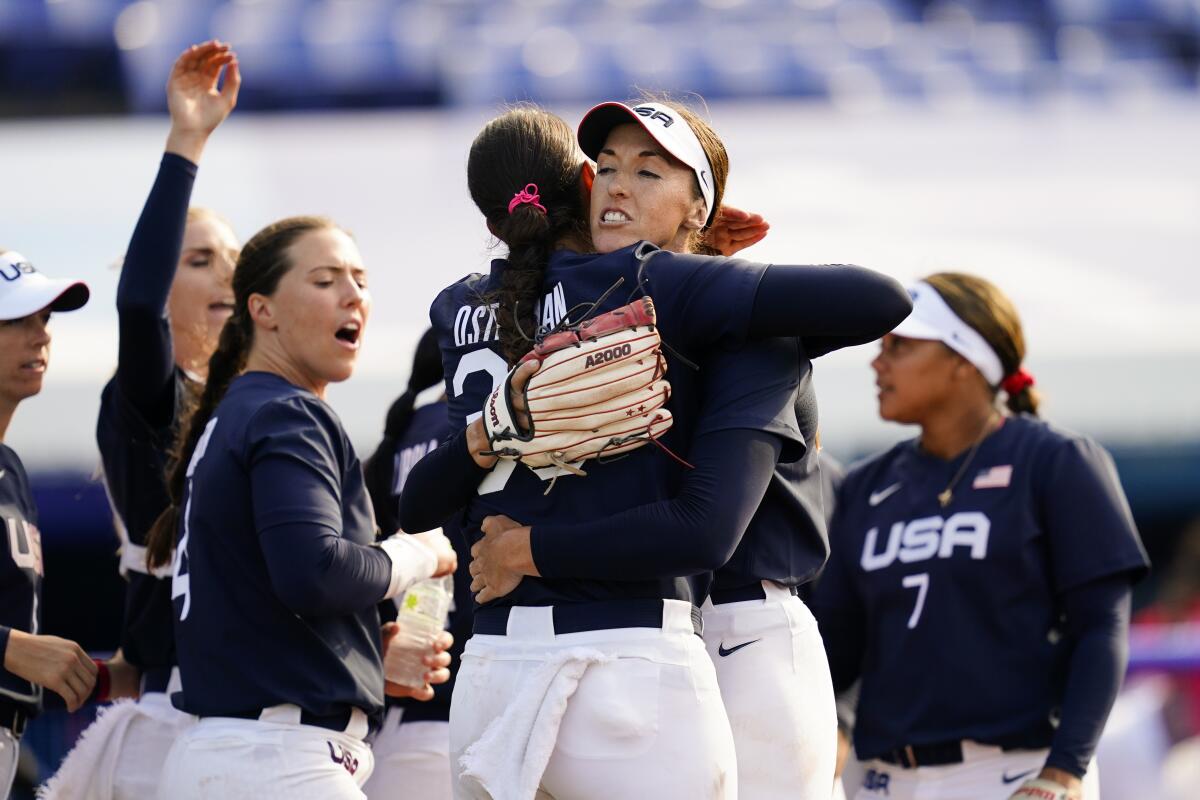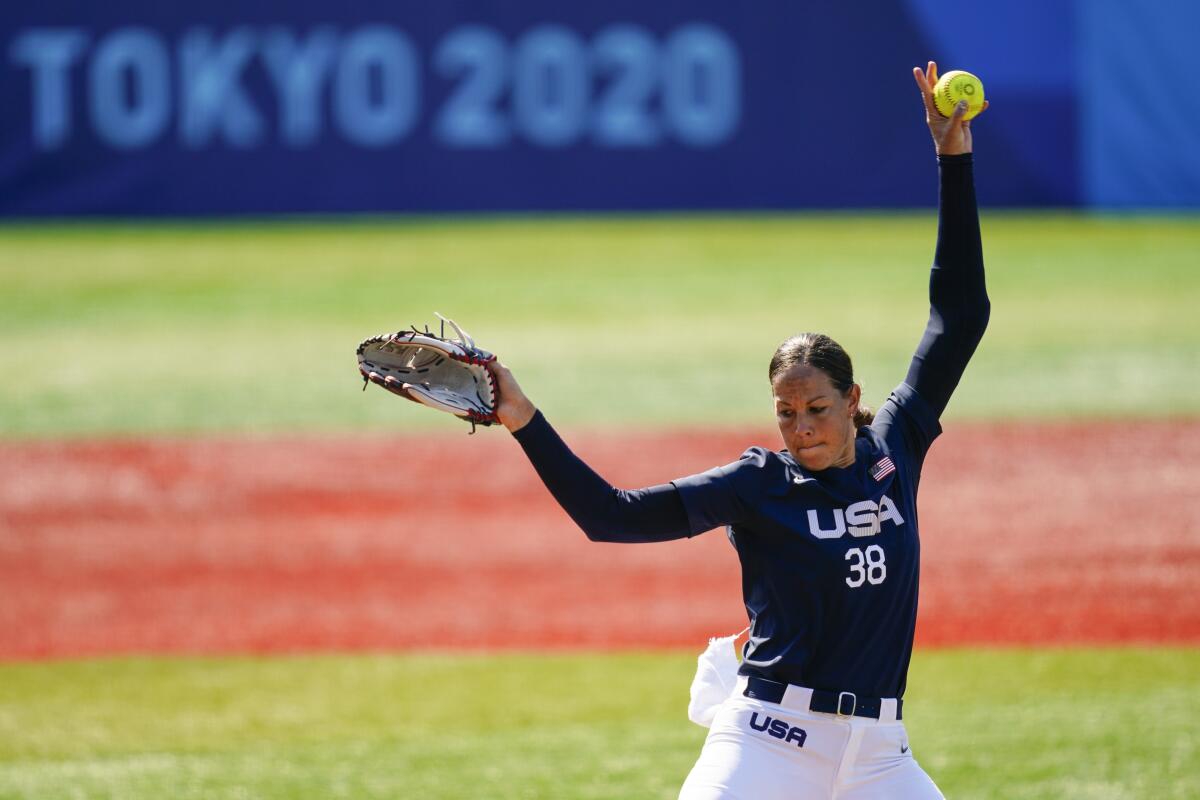After 13 years, Cat Osterman and Monica Abbott yearn for a golden chance at revenge

- Share via
YOKOHAMA, Japan — Olympic oblivion never came after the heartache, the tears and the loss they feared might represent their final moment on this stage.
Thirteen years after Cat Osterman and Monica Abbott walked off that field in Beijing and into a foreboding future, their gold medal snatched by Japan, their sport on the verge of elimination, they have been granted a reprieve.
Unable to rewrite history, the U.S. softball star pitchers can add an epilogue, a matchup against Japan in the final game of pool play on Monday at Yokohama Baseball Stadium representing a prelude to possible redemption.
Judo coach Yosh Uchida continues to affect the lives of Olympians at 101. One of his pupils, Colton Brown, is competing at the Tokyo Olympics.
Having gone unbeaten through the first four games of the opening round, the tournament’s favorites will meet again Tuesday in the gold medal game. The only thing at stake Monday, other than maybe establishing a psychological edge, is determining the home team for the championship.
Abbott, 35, has made Japan her part-time home for more than a decade. She, along with Osterman, 38, are the only players with Olympic experience on a U.S. team that skews much younger.
Abbott has starred for the Japan Softball League’s Toyota Red Terriers since 2009, becoming “Moniechan” to teammates and “Abboto” to fans who have embraced her dominance. There have been showdowns against Yukiko Ueno, the homeland hero who downed the Americans in the championship of the 2008 Beijing Olympics and is one of three Japanese players seeking a repeat, but nothing like the stakes that lie ahead.
“She throws 70s and I throw low 60s, and I throw down in the zone and she throws up in the zone, so we’re drastically different as far as pitchers.”
— Cat Osterman on the pitching duo of Monica Abbot and herself
Abbott described the chance to beat Japan after so many years and so much roster turnover as a moment to savor, even if it can’t erase what preceded it.
“I think 2008 memories and feelings linger for Cat and I as returning players,” Abbott said, “but more so, I think we just want to play on the field and we want to be present in every moment and leave without any regrets.”
Osterman retired from professional softball in 2015 only to return two years later after getting passed over for a coaching job. The snub didn’t bother her, sparking a realization that she still yearned to play. Just as important, she still could.

U.S. coach Ken Eriksen dubbed his veteran duo “Fire and Ice,” a nod to Abbott’s blistering pitches and Osterman’s guile that allows her to dominate despite throwing much slower than her teammate.
“She throws 70s and I throw low 60s, and I throw down in the zone and she throws up in the zone,” Osterman said, “so we’re drastically different as far as pitchers.”
A 6-foot-3 left-hander, Osterman is the last remaining player from the U.S. team that won gold in 2004 in Athens. The Americans seemingly could have taken on Greek gods after outscoring their opponents by a 51-1 margin. By that point, the U.S. had won gold in every Games since the sport’s debut in Atlanta in 1996.
It was widely speculated that U.S. dominance partially fueled the International Olympic Committee’s vote for an extended hiatus before Japan upset its rival in the sport’s sendoff in 2008. That no longer appears to be an issue.
Nearly every game in these Olympics has been taut. The U.S. has allowed only one run in four games thanks to nearly flawless pitching and defense but has struggled to score, batting only .237 and averaging 1.75 runs a game. Osterman called these “the most competitive games that Olympic softball has ever had.”
Abbott said she considered Japan the favorite because the defending champions were returning their ace, top slugger and starting catcher from 2008, all while playing in familiar territory. The empty seats prompted by COVID-19 restrictions can’t erase Japan’s home-field advantage, regardless of whether it bats in the top or bottom of an inning.
Win or lose, Osterman and Abbott have both acknowledged this is it. Emerging stars such as outfielder Haylie McCleney, whose .727 batting average in these Games leads all hitters, are the team’s future.
Softball will sit out the 2024 Paris Games, a victim of low popularity in the region, before an expected return in 2028 in Los Angeles. By then, Osterman and Abbott would likely transition into coaching roles, should they choose to remain with the team.
First things first. Osterman, the losing pitcher in the final game against Japan in 2008, said she wanted her teammates to experience the joy she felt while winning gold four years earlier. Avenging defeat is not a primary motivator.
“If that’s what’s driving me every day,” Osterman said of revenge, “I’m here for selfish reasons. This group is the most important group, and I’m here so they can win a gold medal.”
More to Read
Go beyond the scoreboard
Get the latest on L.A.'s teams in the daily Sports Report newsletter.
You may occasionally receive promotional content from the Los Angeles Times.









